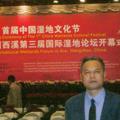首届中国湖泊论坛发布《南京宣言》
专业号:鄱湖人家 2011/12/12 7:42:20
中国江苏网
宣言中称:中国的天然湖泊有2.4万个,总面积达8.3万平方公里,遍布东中华大地,起着维系生态平衡、调蓄洪水、滋养万物的重要作用。其中,鄱阳湖、洞庭湖、太湖、洪泽湖、巢湖等五大湖总面积占全国湖泊面积的三分之一。但如今受气候环境变化和人类活动影响,湖泊生态系统正面临严峻考验,每年有20个天然湖泊“被死亡”,维护湖泊生态健康,促进人湖和谐相处刻不容缓。
作为此次论坛的另一项重要成果,《中国五大淡水湖保护与发展》报告也在会上进行了首发式。“目前,我国五大淡水湖保护与发展进入由注重开发转向开发——保护——治理并重的重大变革时期,使资源开发利用——生态环境保护——社会经济发展三者逐步协调。”据中科院南京地理与湖泊研究所高俊峰介绍,报告共分三篇十一章,涵盖了湖泊现状与回顾,热点与焦点问题分析和评述,保护与发展的战略与对策等内容。其中,“巢湖的水土流失与湖体富营养化”、“洪泽湖的入湖河道污染和上游污水”、“水资源保护与南水北调工程”等社会关注度高的“热点”都能在报告中找到答案。据悉,该报告经过20余位专家2年的努力完成,是国内首部针对中国五大淡水湖保护与发展的研究报告。
附:《南京宣言》
人湖和谐:让“生命之源”永续
湖泊,有人叫她“母亲”,因为她沟江通海,哺育人类历史灿烂文明;有人称她“明珠”,因为她散落平原,处处莲叶田田渔舟唱晚;有人喊她“海子”,因为她隐身高山,实现山民眺望大海情愫。正如李白有诗云:“洞庭湖西秋月辉,潇湘江北早鸿飞。”湖泊作为地球上重要的淡水资源库,占地表液态淡水资源90%以上,自古以来就是芸芸众生重要的栖息地,与人类发展唇齿相依、休戚与共。
中国幅员辽阔,湖泊众多,天然湖泊有2.4万个,总面积达8.3万平方公里,遍布东中华大地,起着维系生态平衡、调蓄洪水、滋养万物的重要作用。鄱阳湖、洞庭湖、太湖、洪泽湖、巢湖等五大湖,烟波浩淼,犹如太初遗珠,齐聚长江、淮河流域,总面积占全国湖泊面积的三分之一,是与经济社会发展最为密切的湖群,对我国资源环境、地理人文具有重要而又独特的作用,不仅关系湖南、湖北、江西、安徽、江苏、浙江和上海等六省一市数亿民众的福祉,而且关系我国经济社会发展的大局。
当前,受气候环境变化和人类活动影响,湖泊生态系统正面临严峻考验,水质恶化,泥沙淤积,湿地萎缩,调蓄洪水能力降低,水生生物资源衰退,每年有20个天然湖泊“被死亡”。昔日可临水照影的碧波,不再清澈;鱼虾水鸟,失去赖以栖息的美丽家园;越来越多的“明珠”蒙尘,变成大地疮痍的“浊泪”。特别是人类生产生活对湖泊的损伤大大超出了湖泊生态自我恢复能力。警钟已经敲响,长此下去,发展难以持续,“生命之源”终会枯竭。我们呼吁,全社会积极行动起来,维护湖泊生态健康,促进人湖和谐相处。我们倡议:尊重湖泊,善待湖泊,保护湖泊,让生命之湖万古奔流,生生不息、造福民生!
尊重湖泊,就是要正视过去对湖泊的伤害,充分认识湖泊生态系统的脆弱性,保持湖泊自身的完整性、多样性和清洁性。以科学的态度,合理进行湖泊开发,控制入湖污染物总量和湖泊内源污染,维护湖泊健康,保障湖泊的可持续发展。
善待湖泊,就是要像珍惜生命一样珍惜湖泊。制定湖泊保护的总体框架,在湖泊的开发利用中,采取有效的举措,规范湖泊的保护与利用。实施河湖连通,恢复湖泊多样化功能,维护湖泊生命健康。进行生态修复,促进湖泊生态系统的良性循环。
保护湖泊,就是要大力宣传“人与湖泊唇齿相依、休戚与共”的观念,彰显湖泊在经济社会可持续发展中不可替代的作用,让“保护湖泊”成为一根红线,始终贯穿在经济社会发展过程中;就是要树立大流域理念,优化流域河湖格局和功能,实施长效综合管理,让湖泊休养生息、恢复生机。
尊重湖泊,就是尊重人类历史!
善待湖泊,就是善待人类自己!
保护湖泊,就是保护人类未来!
维护湖泊健康,人人有责。让我们携起手来,共同行动,开创人湖和谐、生态文明的新时期!
Nanjing Declaration of 1st
(
Harmony between Man and
— Keep Source of Life Everlasting
On December 9-11, 2011, we gathered in
Some people compare the lake to the mother of the land, as she is connected to rivers and the sea, helping foster the splendid human civilization; others compare it to a bright pearl, as stretches of the plains are dotted with her sparkling waters, on which lotus plants are in bloom, and over which fishermen in fishing boats fill the evening air with songs; still others compare it to the son of the sea, as it can, so to speak, satisfy the mountaineers’ desire to view the sea. No wonder famous Chinese ancient poet Li Bai sang the beauty of lakes in some of his poems. As an important source of the earth’s fresh water, lakes contain over 90 percent of freshwater resources, and have served as an important habitat for living creatures ever since ancient times. Thus it can be well said that human development depends heavily on them.
At the moment, the ecological system of lakes is confronted with severe challenges due to the climate change resulting from human activities—water quality is deteriorating, sediment accumulating, wetlands shrinking in size, aquatic organisms dying out, and consequently the capacity of flood control and drought relief affected. Every year about 20 natural lakes dishearteningly disappear. The previous limpid and beautiful waters no longer exist; fish, shrimps and wild birds have lost their habitats; and those “pearls of the pearls” are tarnished and tainted, eventually becoming, as it were, filthy pools of tears. What is the cause for this situation? The root cause is that the damage originating from human activities of production has exceeded the self-adjusting capacity of lakes. The alarm bell is ringing—the source of life will dry up and thus the development will be unsustainable. Therefore we now call on the whole society to step up efforts to preserve the ecological health of our lakes and promote harmonious coexistence of human beings and our lakes. We propose that we should respect our lakes, properly treat and protect them to make this source of life everlasting.
Lakes are to be respected. We should be fully aware of the damage inflicted on our lakes in the past, and of the vulnerability of their ecological system; we should realize the importance of protecting their integrity, variety of wildlife and environment, adopting a scientific approach in their development, strictly controlling contaminants coming into our lakes.
Lakes are to be kindly treated. We ought to treasure our lakes as much as we treasure our own lives; we shall draft the framework of the lake preservation, and take effective measures to standardize the operations in the lake development, to restore their various functions by repairing the ecological damage and promoting their ecologically virtuous cycle.
Lakes should be protected. Publicity campaigns are to be launched on the relationship between man and lake to strike the public into full awareness that human existence relies on lakes, and that our lakes play an indispensible role in both economic and social development; we should give priority to the protection of lakes and optimize the administrative functions to ensure that they are properly preserved and revitalized.
Respecting lakes is tantamount to respecting human history!
Kindly treating lakes is equivalent to kindly treating us human beings!
Protecting lakes is just as important as protecting humanity!
Every human being is obligated to keep lakes healthy. Let’s join our efforts to establish an ecologically-friendly era in which harmony prevails between man and lake
推荐
| 我也说两句 |
| 版权声明: 1.依据《服务条款》,本网页发布的原创作品,版权归发布者(即注册用户)所有;本网页发布的转载作品,由发布者按照互联网精神进行分享,遵守相关法律法规,无商业获利行为,无版权纠纷。 2.本网页是第三方信息存储空间,阿酷公司是网络服务提供者,服务对象为注册用户。该项服务免费,阿酷公司不向注册用户收取任何费用。 名称:阿酷(北京)科技发展有限公司 联系人:李女士,QQ468780427 网络地址:www.arkoo.com 3.本网页参与各方的所有行为,完全遵守《信息网络传播权保护条例》。如有侵权行为,请权利人通知阿酷公司,阿酷公司将根据本条例第二十二条规定删除侵权作品。 |
 m.quanpro.cn
m.quanpro.cn